Forty Hall Vineyard – Growing grapes in London for the good of people, not profit
19th February 2025
Forty Hall Vineyard is London’s only commercial-scale vineyard, and is run as a not-for-profit social enterprise. Its head of operations, Emma Lundie, explained how it works to Fruit & Vine editor Rachel Hicks.
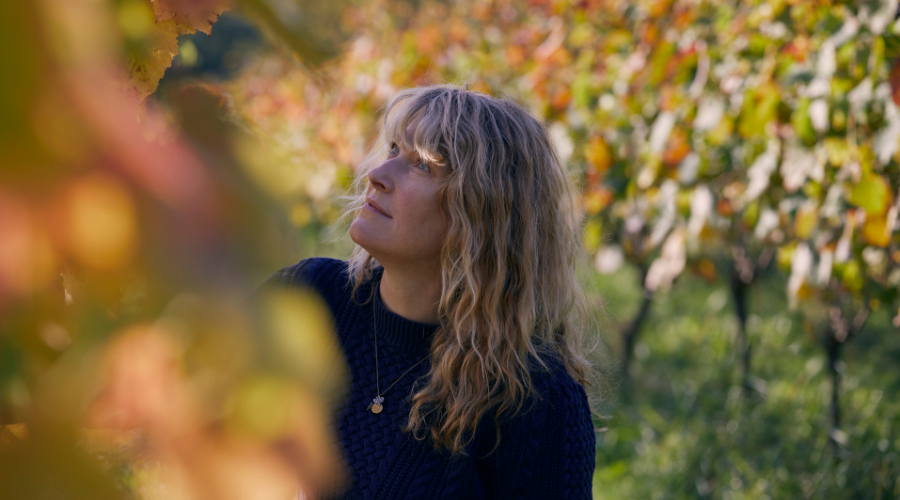
Emma Lundie is a social entrepreneur and local food sustainability champion, as well as the head of operations at Forty Hall Vineyard. The vineyard is a ‘not for profit’ social enterprise that is largely tended by a group of over 100 dedicated volunteers, with a small management team to oversee the work. Income from the sales of the wine is put back into the project to sustain the vineyard, and allow it to deliver mental health and wellbeing benefits to its community.
“I had a background in marketing and networking local food producers as well as running food events,” explains Emma. “I have made it my mission to connect consumers with growers and makers, including a farmers’ market that takes place on Forty Hall Farm, where the vineyard is located. So I originally came to the vineyard to help promote the project and its wines.
“I quickly became immersed in the project, and the world of viticulture as a whole – it was a completely unique environment in London, with an amazing volunteer community. I loved the focus on people and the beneficial connection with nature.”
In 2019, the founder of Forty Hall Vineyard, Sarah Vaughan-Roberts, stepped down and Emma was passed the baton, taking on the role of leading the project. “It felt like a natural progression in many ways, but I had to learn vineyard management very fast!” she shares. “I was very lucky to have a lot of expertise around me, including the vineyard manager at the time Chus Bartolome who taught me an incredible amount along with our wine making partner Will Davenport.”
With a community of over a hundred volunteers and sales and events to oversee, there are many elements to Emma’s role – with no day ever being the same.
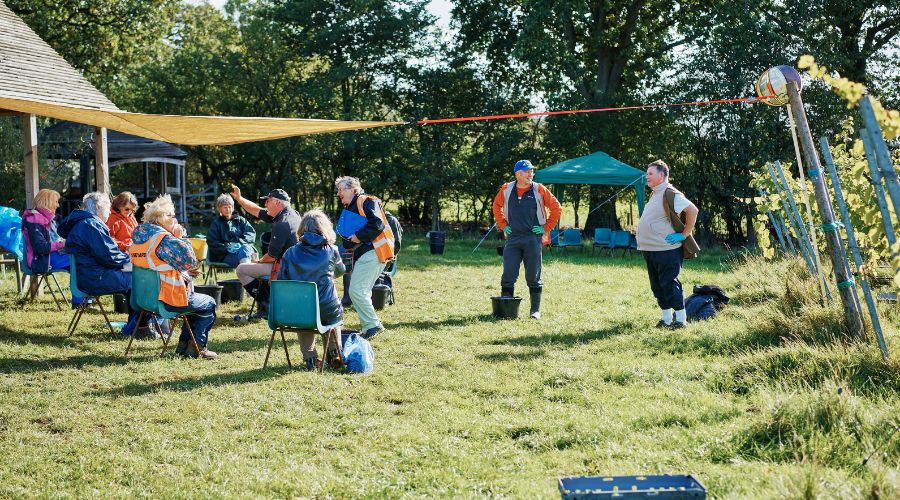
History of the vineyard
The vineyard was planted in 2009, originally just 1,000 Bacchus vines planted by hand, on one acre of land. However, these failed and were eaten by sheep. So they replanted Bacchus in 2010, this time mechanically, followed by an expansion in 2011 of a further 13,000 vines, including Ortega, Chardonnay, Pinot Noir, and Pinot Meunier.
Capel Manor College, London’s environmental college, gave the project use of the land at Forty Hall Farm, Enfield to plant the vineyard as a community growing project.
At the time, the farm was being newly developed primarily for use by students as a place of learning, but also for community benefit. The fields hadn’t been farmed for a number of years, so when the vines were planted it was always intended to be done so sustainably and organically.
At the time this was considered madness, especially in the middle of London. Three years after the vines were planted, Forty Hall Vineyard was Certified Organic by the Soil Association. The vineyard now covers 4.5ha across two fields.
While the vineyard is in a good position, south facing on a gentle slope, Emma explains there have been challenges with compaction and collection of water in the bottom of one of the fields: “To remedy this, we have recently created some drainage channels through the field in the worst section to filter into a pond at the bottom, which also encourages more biodiversity. Our other field hasn’t presented these challenges as the slope is perfect there, and the soil slightly better for natural drainage.”
London heat
A London location might not sound ideal, but it has its advantages, as Emma explains: “Being within the M25 we are a few degrees warmer here, with the heat generated from the city of London providing a bit of a blanket for us! We generally find we’re at least a week ahead in the growing season and harvesting than the rest of the south east.
“We are a little exposed in parts and have, on occasion, had some icy easterly winds whipping through, after bud burst. We’re increasing tree planting in areas to provide more wind breaks and, in one section on the westerly side, lowering the tree line to create a channel so the wind can pass through from east to west and not get trapped in the vineyard, damaging the vine; this will also help us with disease management by increasing airflow.
“We’re also going to experiment with covering the vines with nets on the east side this year to see if that has any impact on breaking any icy winds before hitting the vines.”
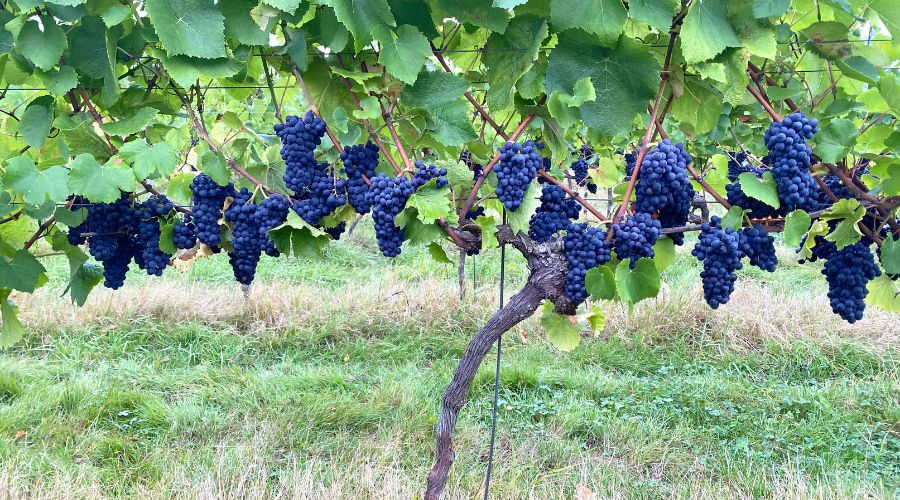
Managing disease, pests and frost risk
On average, Forty Hall harvests around 12 tonnes per year. However, Emma points out that there are huge fluctuations year-by-year. “We had three years in a row where we were barely able to scrape three tonnes, thanks to frost damage followed by two years of devastating powdery mildew. Since then, we have invested in better spray equipment, and a tractor that we have for our sole use and not shared with the rest of the farm, so we can spray exactly when we need to.
“We also invested in an undervine strimmer built for us by Voxx Machinery to control the undervine growth, which is one of the biggest challenges in an organic vineyard. The long grass and weeds create a perfect environment for disease, prevent good airflow and deprive the vines of nutrition. Keeping this down really supports the health of the vines. “Voxx Machinery owner Rob Burr is always on hand to offer advice, maintenance and support,” Emma says.
Over the winter the farm’s sheep come into the fields to graze, keeping the grass and under-vine growth down while fertilising the ground.
“We also focus our efforts on flag shoot removal, and that has made a huge difference. 2023 was our best year ever – we harvested 32 tonnes. Prior to that our highest yield was 18 tonnes in 2018, so this was quite extraordinary! Thanks to the investments we anticipate our average yield will increase, weather permitting.”
Emma points out that last year was challenging though, with lots of rain early in the year making it difficult to spray and to pass through with the tractor to strim under the vines.
“For the first time ever, we had an issue with snails and slugs, eating the leaves and buds at the beginning of the season. Flowering was also compromised. Another challenge was the lack of sun. We harvested later than ever before, beginning at the second week of October – we held our breaths waiting for veraison and thankfully, with the advantage of our London climate, we were a week ahead of most vineyards and did get the sugars and acidity to the ideal point needed for good wine.”
Powdery mildew has been Forty Hall’s biggest threat, and removing infected shoots as early as possible is the most effective method of control in an organic vineyard. “Our viticulture manager Christian has his eyes to the vines, but we also have a task force of volunteers monitoring them from May onwards. We use a combination of sulphur and copper in line with our organic status and potassium bicarbonate as an eradicant to control the spread of powdery mildew if it does establish.
“Our viticulture manager Christian is on site at least twice a week. But at one point we also invited a consultant from Vinescapes in for a second opinion on our priorities in terms of equipment and disease management. This was really helpful and gave us the confidence to use our resources to fundraise for the equipment we desperately needed.
“In addition to the undervine strimmer from Voxx, we also invested in a new sprayer from Ernest Doe which has made all the difference to the effective coverage of spray across the vineyard.
“Birds consistently cause problems for us, and 2024 was particularly bad. We move bird scaring kites around the field after veraison but the most effective control we’ve found is a bird sound box. It releases a variety of bird sounds through speakers throughout the vineyard that confuses and deters most birds, but the parakeets wise up to it after a few weeks so we have a limited time to use it.
“In 2024 we had a longer wait to harvest, so the birds had longer to feast, it was quite frustrating. We were very happy to finally get the grapes picked and away to the winery. Although not a bumper year, under the conditions, we were happy with the yield. So many vineyards lost their entire crop due to the lack of sun, and increased disease and pest pressures.”
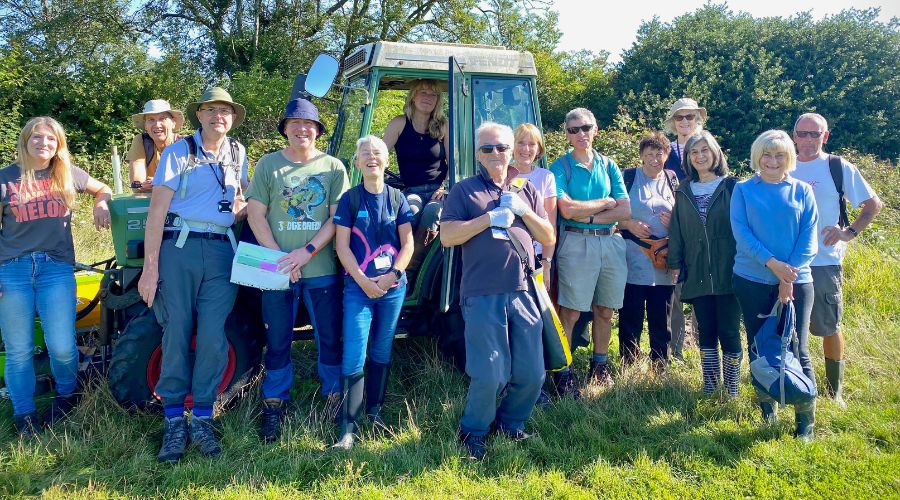
Vine management
Forty Hall trains its vines on the VSP Guyot system – alternating the direction of one fruiting cane from year to year. The trellising has metal posts and two pairs of foliage wires, above the fruiting wire to support the growth.
Emma and her team use the ‘gentle pruning method’ as taught by Simonit & Sirch. The method respects the natural, organic structure of the vine by encouraging sap to flow evenly and freely through both sides of the vine, by opening out the vine and reducing scarring inside through larger cuts on
older wood.
All the grapes are harvested by hand. “In addition to our regular volunteers, we invite friends, family and the local community in to join us for picking,” shares Emma. “It’s a really enjoyable communal experience for everybody who joins in, although it does take some coordination. We can have up to 70 volunteers joining in on a pick if there’s a high yield, and our grapes are transported to the winery within hours.”
Making wine
The vineyard generally produces two stills; a single varietal Ortega and Bacchus, and a traditional method sparkling – the London Brut. “Although we do experiment and adapt depending on the yield,” explains Emma. “Last year we decided not to make a sparkling as we have so much already in production from 2023 to be released this year. Instead, we decided to create a rosé from our Pinot grapes. This is the first produced from our grapes, so we’re really looking forward to that.”
Forty Hall’s own grapes create the wines by pioneering organic winemaker Will Davenport. “He is an exceptionally experienced organic winemaker who shares our ethos and uses minimal intervention – letting the grapes speak for themselves. We do also now sell some of our grapes to ease the cashflow. We ensure we sell to winemakers who share our ethos. It’s really exciting to taste the wines they create from our organic London grapes and to build partnerships within the industry.”
The majority of the wines are sold directly online and via the farm shop at Forty Hall Farm, as well as the farmers market on the farm once a month. Emma says they have a very loyal following locally who appreciate the wine and support their ethos. They also sell some of their wines to trade to independent retailers and wine merchants.
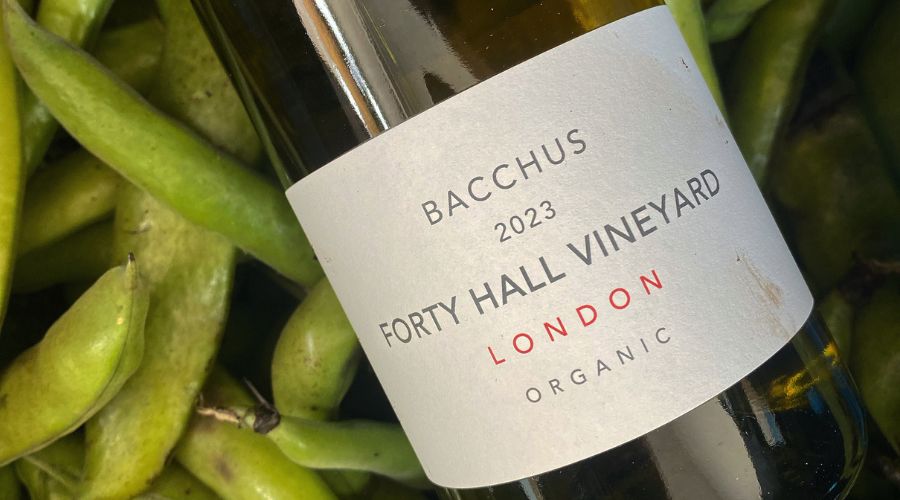
Welcoming students and visitors
Forty Hall Vineyard is the site of learning for an exciting range of part-time viticulture courses at Capel Manor College, London’s environmental college. The introductory courses in viticulture and wine business offer an opportunity for people in and around London to begin their path to a career in the UK’s rapidly growing wine industry or simply develop a personal interest.
The vineyard also offers monthly tour and tasting events from April to October. The tours run alongside the farmers’ market, providing a full day out at Forty Hall Farm. Emma adds: “Last year we also had a successful ‘Picnic in the Vines’ event with live music that I’m planning to repeat again this year.
“We aim to be fully sustainable financially through wine sales and other activities without relying on fundraising. I would like to be able to extend our learning and wellbeing activities for the community to come in and benefit from the environment. A new visitor/classroom building in the vineyard would be the dream.”
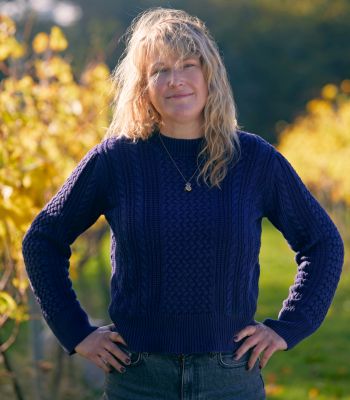
Grower Profile
Forty Hall Vineyard – view site.
Location: Enfield, London
Total vineyard size: 4.5ha
Soil type: The top layer is made up of brown earthy clay and flints. Beneath this is Boyn Hill Terrace which contains brown sand, gravel and flint and heavier clay, and deeper below that is stiff, brown, and impermeable London clay
Aspect: South facing gentle slopes, with a warming microclimate due to proximity to London
Varieties grown: 61 rows of Bacchus and 18 rows of Ortega for stills, plus 14 rows of Chardonnay, 35 rows of Pinot Noir and Pinot Meunier to create Forty Hall’s sparkling wine
